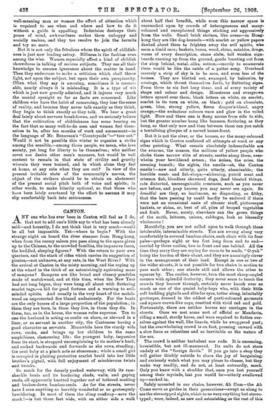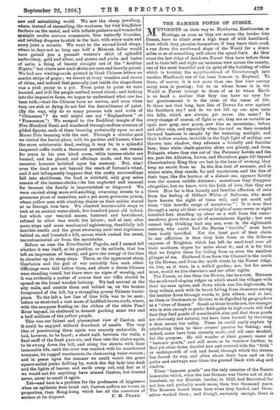CANTON.
ANY one who has ever been in Canton will feel as I do, that not to add one's little say to what has been already said—and honestly, I do not think that is very much—would be all but impossible. Yet—where to begin ? With the strange night on board the river steamer from Hong-kong, when from the roomy saloon you pass along to the space given up to the Chinese, to the crowded families, the impassive faces, the huddled, sleeping figures ? With the return to your own quarters, and the stack of rifles which carries its suggestion of pirates,—not unknown, at any rate, in the West River? With the arrival at Canton in the misty morning, and the roping up at the wharf in the thick of an astonishingly squirming mass of sampans P Sampans are like broad and clumsy gondolas made of matchwood, and at this time, when the New Year had not long begun, they were hang all about with fluttering scarlet tags,—a bid for good fortune and a warning to evil- minded spirits. And usually in the very heart of the match- wood an unprotected fire blazed audaciously. For the boats are the only homes of a large proportion of the population ; in them they are born, in them they live, in them they die. In them, too, as in the house, the woman rules supreme. Ten to one the husband is acting as coolie on shore, as steward in a liner, or as servant in another city, the Cantonese having a good character as servants. Meanwhile here the sturdy wife rows, cooks, and brings up her children to the same amphibious, clamouring life : the youngest baby, impassive from its start, is strapped uncomplaining to its mother's back, and rocked backwards and forwards as she rows, standing; the next baby at a pinch acts as steersman; while a small girl is occupied in plaiting protective scarlet braid into her little brother's pigtail, with full enjoyment of mischievous twists and tweaks.
So much for the densely packed waterway, with its ram- shackle boats and its bordering sheds, walls, and gaping roofs, all apparently knotted together out of tattered matting and broken-down bamboo-reeds. As for the streets, never have I seen anything so horribly wonderful or so grotesquely bewildering. In most of them the slimy roadway—save the mark !—is but three feet wide, with on either side a walk about half that breadth, while even this narrow space is encroached upon by crowds of heterogeneous and many-
coloured and unexplained things sticking out aggressively from the walls. Small brick shrines, like ovens—in Hong- kong they are like dog-kennels—with scarlet or yellow papers daubed about them to frighten away the evil spirits, who seem a timid race; baskets, boxes, wood, china, eatables, drugs, wares of every description, stone slabs, tall wooden sign- boards running up from the ground, goods bursting out from the shop behind, metal, silks, cotton,—merely to enumerate them would be like the rattle of a patter song. Overhead scarcely a strip of sky is. to be seen, and even less of the houses. They are blotted out, swamped, by balconies, by awnings, which thrust themselves forth, by fluttering signs. From three to six feet long these, and of every variety of shape and colour and design. Monstrous and overgrown letters sprawl over them, black letters on white, on scarlet; scarlet in its turn on white, on black ; gold on chocolate, green, blue, strong yellow, fierce dragon's-blood, angry orange,—the audacious colours wave and glow in the veiled light. Here and there one is flung across from side to side, but the greater number hang like banners, flattering as they hang, so that only now and then between them can you catch a tantalising glimpse of a carved house-front.
But it is not the river, or the houses, or the many-coloured signs which in Canton confound all attempts at word or any other painting. What remain absolutely indescribable ar• the swarms, the masses, the millions of yellow people who choke these narrow slits of streets, seethe along them, over- whelm your bewildered senses ; the noises, the cries, the seeming tumult; the sights, the smells—oh, the Canton smells !—new and utterly, quite utterly, abominable; the horrible meat- and fish-shops,—sickening, putrid meat and crimson fish, bloodless skewered dogs, dead bloated things, rats distorted, unrecognisable creatures, such as you never saw before, and pray heaven you may never see again. So dreadful are they, so loathsome, so disgusting, so filthy, that the bare passing by could hardly be endured if there were• not an occasional oasis of cleaner stuff, picturesque baskets, or china, or, best of all, piles of heaped vegetables and fruit. Never, surely, elsewhere can the green things of the earth, lettuces, onions, cabbages, look so blessedly wholesome !
Mercifully, you are not called upon to walk through these intolerable, interminable streets. You are swung along very comfortably in covered bamboo-chairs, each chair with its four poles—perhaps eight or ten feet long from end to end— carried by three coolies, two in front and one behind. All the time they carry they are crying for room to be made, " 0-yah" being the burden of their chant, and they are amazingly clever in the management of their load. Except in one or two of the wider streets, it is not possible for two chairs in motion to pass each other; one stands still and allows the other to squeeze by. The coolies, however, turn the most sharp-angled corners with splendid dexterity; they never seem to touch the crowds they burrow through, certainly never knock over so much as one of the quaint baby-boys who, with their little soft budding pigtails and slits for eyes, totter along, inimitably grotesque, dressed in the oddest of parti-coloured garments and square crown-like caps, rosetted with vivid red and gold. Fortunately, there are neither horses nor carriages in the streets. Once we met some sort of official or Mandarin, riding a small, sturdy horse, and were required to flatten our- selves against the wall, like lizards, while he swaggered past; but the overwhelming crowd is on foot, pressing onward with a slow force as relentless and as inevitable as the waters of the sea.
The crowd is neither turbulent nor rude. It is unceasing, irresistible, but not ill-mannered. Its units do not stare unduly at the "foreign devils." If you go into a shop they will gather thickly outside to share the joy of bargaining, and curiously watch what you may please to choose, but they make way readily, and do not, at least outwardly, mock. Only you know with a shudder that, once you lost yourself among their myriads, lost you would be—utterly swallowed up—sucked in.
Safely mounted in our chairs, however, Ali Cam—the Ah Cums serve as guides in their generations—swept us along to see the stereotyped sights, which to us were anything but stereo- typed ; were, indeed, as new and astonishing as the rest of this new and astonishing world. We saw the cheap jewellery, where, instead of enamelling, the workmen lay tiny kingfisher feathers on the metal, and with infinite patience and wonderful eyesight evolve curious ornaments, blue butterfly brooches, and twirling dragons to stick in the hair, with every scale and every joint a miracle. We went to the second-band shops, where in days not so long ago half a Mexican dollar would have gained you a peasant woman's skirt of splendid embroidery, gold and silver, and greens and pinks and lustre of satin, a thing of beauty straight out of the " Arabian Nights," but where now such skirts are rare and heavily priced. We had our visiting-cards printed in black Chinese letters on scarlet strips of paper; we stared at ivory wonders and stores of china, and noticed that generally just inside the shops there was a pink peony in a pot. From point to point we were hurried, and still the people seethed round about; and looking into the impassive faces, we began to understand what one has been told,—that the Chinese have no nerves, and even when they are sick or dying do not feel the desirableness of quiet. (By the way, why do so many persons talk and write of " Chinamen" P As well might one say " Englandmen " or "Francemen.") We escaped to the Buddhist temple of the Five Hundred Genii and wandered through endless avenues of gilded figures, each of them beaming archaically upon us, and Marco Polo beaming with the rest. Through a circular gate we visited the burial-place, with its gardens and houses, where the more aristocratic dead, resting, it may be, in a splendid lacquered coffin worth a thousand pounds or so, can remain for years in his own hired room, while incense-sticks are burned, and tea placed, and offerings made, and the usual ancestor honours lavished upon his memory. But, alas ! even the dead are not beyond the reach of fortune's wheel, and it not infrequently happens that the costly surroundings fall into shabbiness, the food is withheld, only grey ashes remain of the incense-sticks,—he lies neglected and uncared for because the family is impoverished or disgraced. We were carried along more evil-smelling, swarming streets to a gruesome place of execution, and a yet more gruesome prison, where yellow men with clanking chains on their ankles stared at us through iron bars. We climbed innumerable steps to look at an ancient water-clock, five hundred years old indeed, but which our wearied senses, battered and bewildered, refused to allow was worth the labour ; and at last, after more steps and more mechanical sightseeing, thankfully left horrible smells and the great swarming ants'-nest nightmare behind us, and breasted a hill, across which rushed the sweet, uncontaminated air from the mountains.
Before us rose the Five-Storied Pagoda, and I cannot tell whether it was itself, or its position, or its solitude, that has left an impression of beauty, and gave one energy at the time to clamber up its steep steps. There, on the uppermost story, Confucius and the god of war amicably face each other. Offerings were laid before them, and about a dozen Chinese were standing round, but there were no signs of worship, and it was evidently a matter of course that our tiffin should be spread on the broad wooden balcony. We had arrived at the eity walls, and outside them and behind us, on the broken foreground of the hill, lay a straggling grassy Chinese burial- place. To the left a low line of blue hills was to be seen ; before us stretched a vast mass of huddled brown roofs, where, with the sampans floating on the ribbon of the white Pearl River beyond, lie sheltered in densest packing some two and a half millions of the yellow people.
This was our fairest and pleasantest view of Canton, and it could be enjoyed without drawback of smells. The very idea of penetrating them again was scarcely endurable. It had, however, to be faced; a short walk between the walls, a final sniff of the fresh pure air, and then into the chairs again, to be swung down the hill, and along the streets with their inexorable life, until the river was reached with its matchwood sampans, its ragged warehouses, its clamouring water-women; and in peace upon the steamer we could watch the great square-sailed junks drifting by, watch the day fade into dusk and the lights of heaven and earth creep out, and feel as if we would not for anything have missed Canton, but trusted never, never to smell it again.
Yet—and here is a problem for the professors of hygiene— when an epidemic does break out, Canton suffers no worse, in proportion, than Hong-kong, which has all the resources of











































 Previous page
Previous page